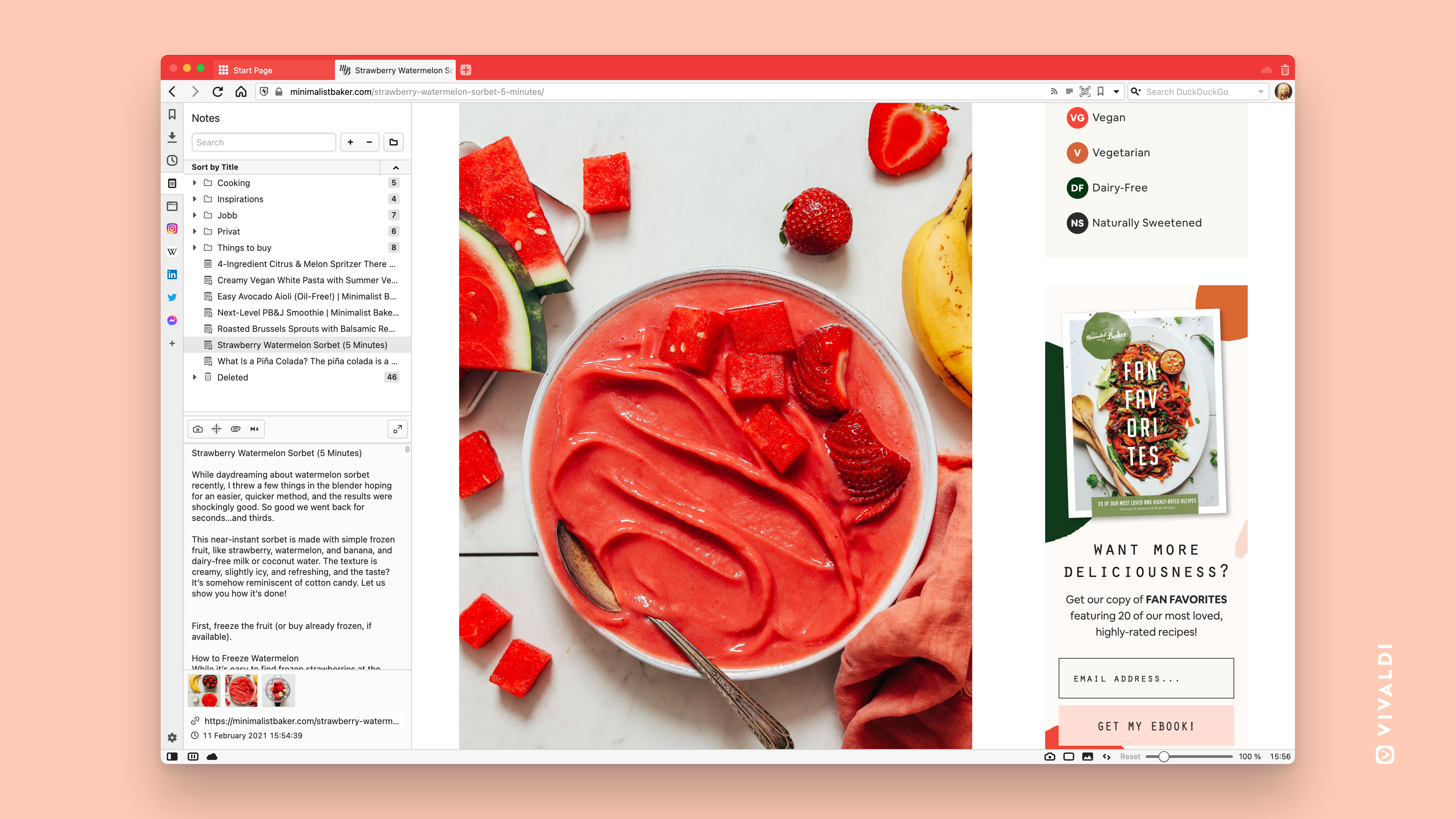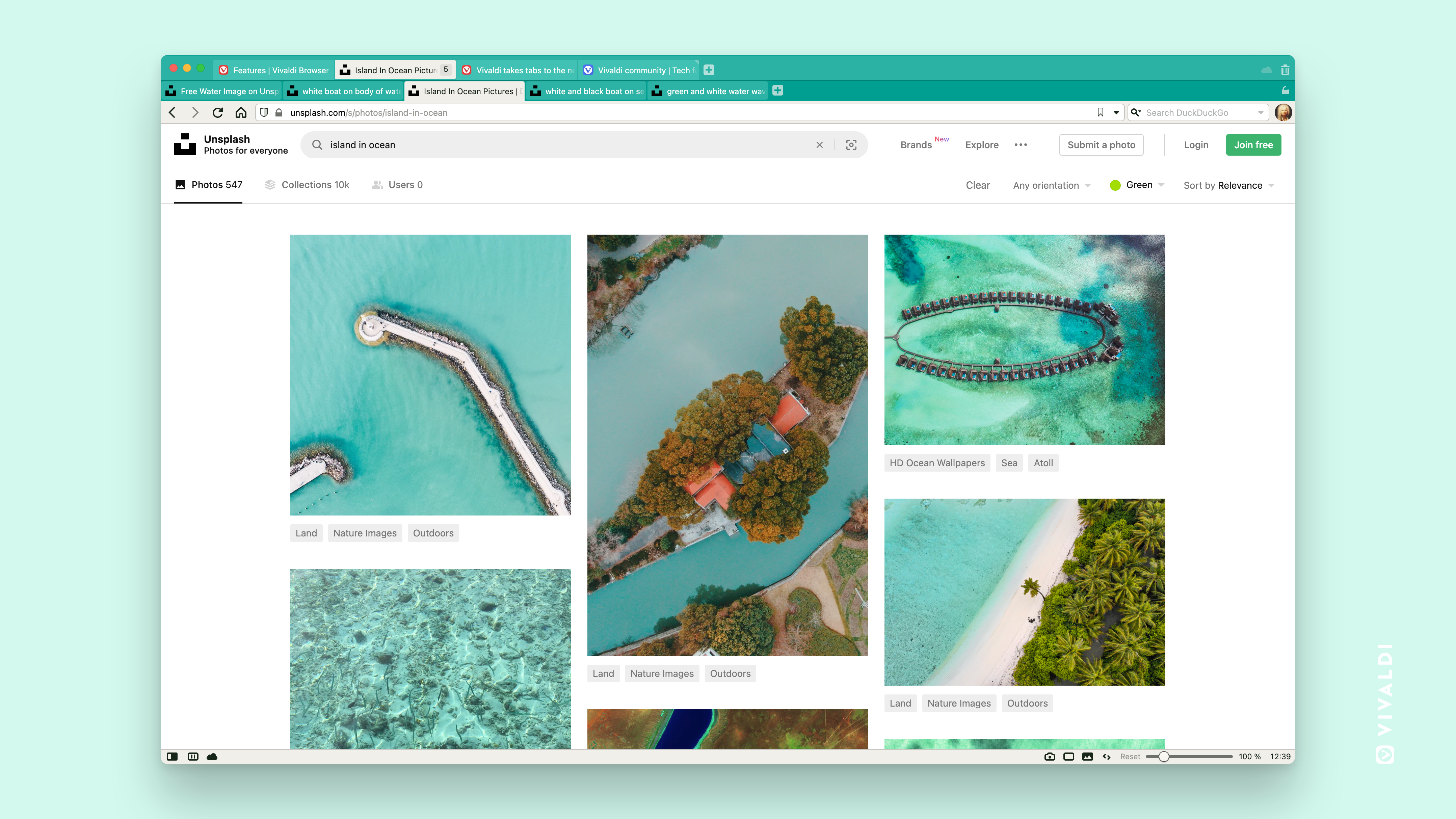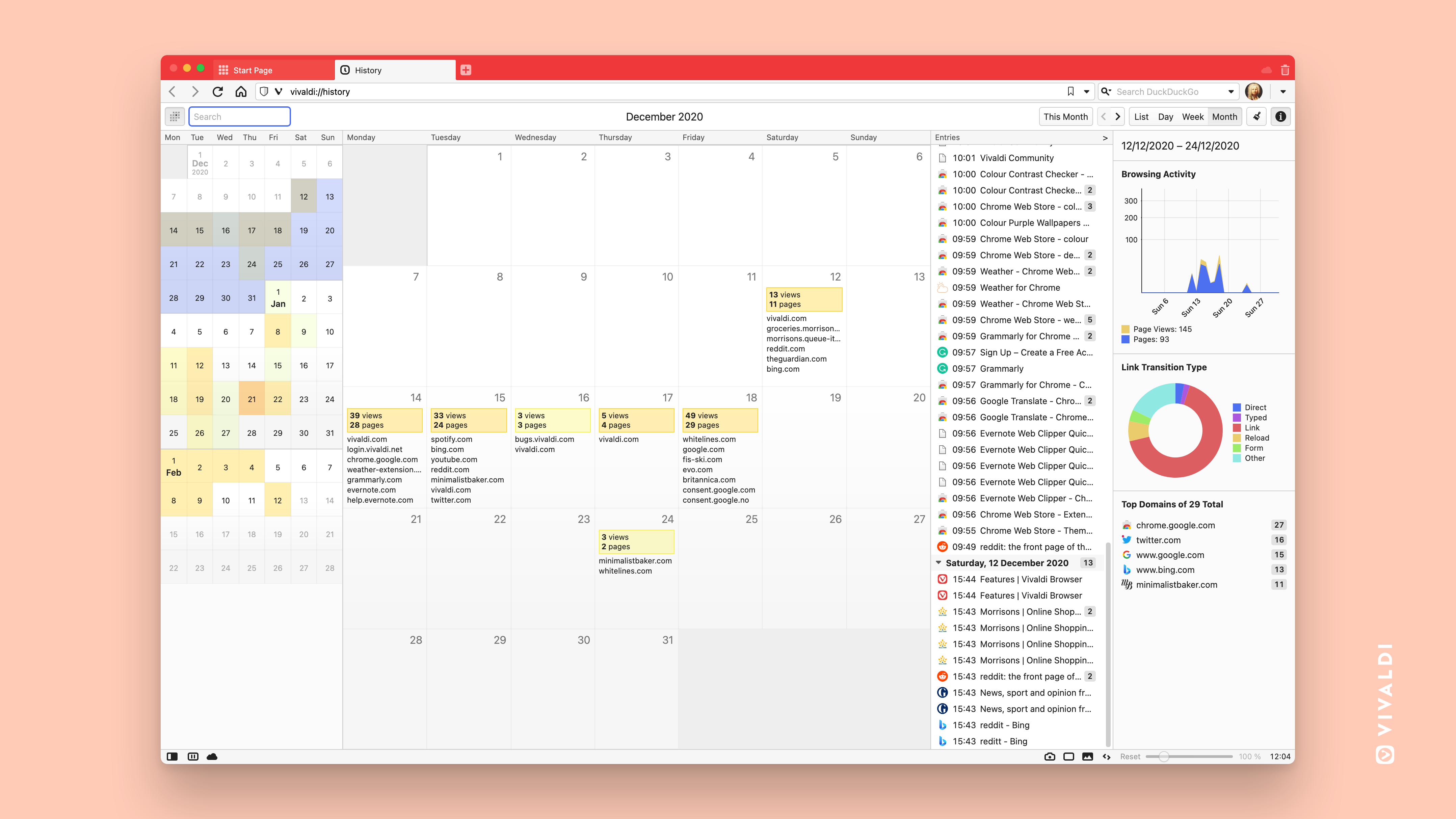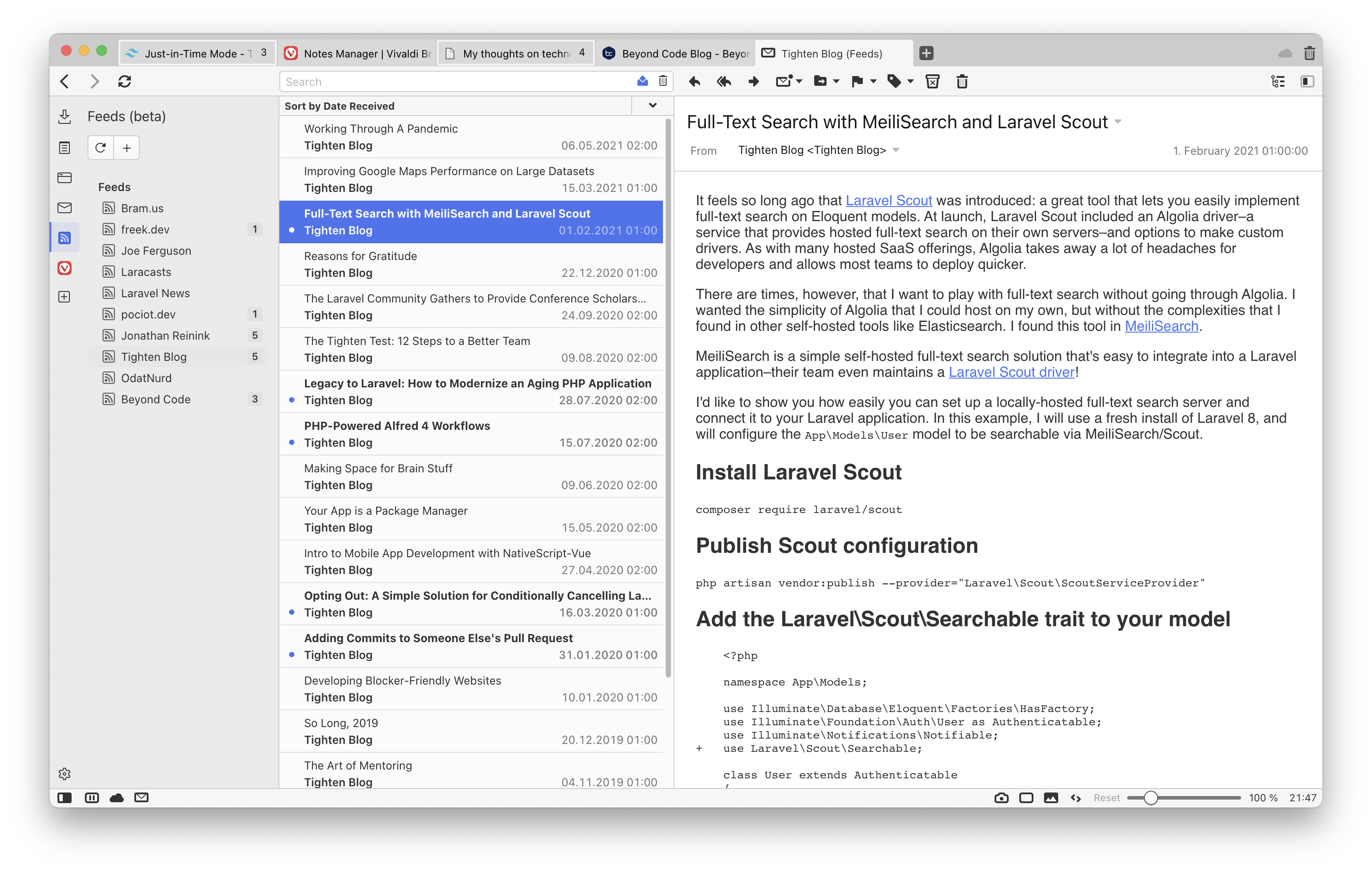
Vivaldi: The best browser for WebDevs
Let me tell you about the web browser that I've been using for the longest time in my life (in different incarnations basically since the late 90s). I'm talking about Vivaldi, the browser for power users and - in my opinion - web developers.
A bit of history
Vivaldi is in a sense the legacy of the Opera browser. It has the same founder and in large parts the same team. A team that was a big contributor to the open web standards we all use today (most notably CSS). A team that popularized features like tabbed browsing, mouse gestures and spatial navigation.
When Opera abandoned its own engine in 2013 and switched to the Blink, all the greatness that was the Opera browser, was abandoned. Fortunately this lead to the founding of Vivaldi, which is also based on Chromium, but with the dedication to be a powerhouse browser with all the features you could ever need (hiding those, you don't).
Features for Web Developers
As web developers, we spend a lot of time in the browser and it fullfils multiple roles for us. It is a research tool that enables us to search the web for the answers we need to do our job. On the other hand it is what we use to view our finished products. It is what we test our webapps with, what we need for debugging and for optimizing performance.
For the latter, Vivaldi offers everthing you know from Chrome. It includes the Chrome Dev Tools and allows you to install everything from the Chrome Web Store. Just as Microsoft Edge, it removed or replaced lots of Google services in Chrome, that generally make Vivaldi less of a resource hog and feel a bit faster. In contrast to Edge, you can opt back into many of these services, if you want.
In this article, I want to concentrate on how Vivaldi helps you as a research tool.
Two Level Tab Stacks

When you research a certain topic, like "What do I need to authenticate an app with AzureAD OIDC?", you tend to pile up lots of open tabs. Vivaldi has tab-stacking to help you organize your tabs. A tab stack is just a tab that has multiple sub-tabs. In Vivaldi this is displayed as a second line of tabs (hence two-level).
You can automatically stack open tabs by host (e.g. all Stackoverflow questions in in one tab). You can also manually drag tabs to stack them or you can opt to open related tabs in a stack.
Extremely powerful search
Just as every good text editor has something like a command palette built-in, Vivaldi has Quick Commands. They allow you to:
- search all open tabs and open the result
- search and open recently closed tabs
- search through all the commands inside Vivaldi (like saving all open tabs to a session, screenshotting the page, or creating a note)
- and much more.
Sessions
Sessions are a great feature that could use a better user experience, though. Lets say we have two dozen tabs open in our research on AzureAD but need to focus on something else. What we can do, is hit Cmd+E and chose Save open tabs as session. We can then close everything and start fresh.
Apple has pretty much copied this feature in the coming Safari 15 (along with coloring the UI according to the current website). In Safari this will be called Tab Groups and you can do one thing, that you can't currently in Vivaldi: You can continue a tab group "session". In Vivaldi you currently still need to save a new session (and optionally remove the old one).
What's cool, though, is that a session even stores the full browsing history for every tab plus individual scroll states. That quickly gets you back on track.
Note-taking
"No thank you, not another note-taking app!" is what you probably think right now. For me, this is mostly true, I use Obsidian for my notes and personal knowledge base.
The notes in Vivaldi are sort-of an in-between. I use them while researching a topic on the web. I can quickly take clippings of websites, or write down tips and advice I read on websites (automatically storing the website I got them from and a screenshot). The notes use Markdown, so when I'm ready to clean them up, I can easily move them to Obsidian.
History

Browsing history seems like an obvious feature, but no browser displays it as well as Vivaldi. It has an actual calendar view of your browsing history which helps a lot if you want to find a website that you recently visited but can't remember.
Email and RSS feeds (beta)

These are new features in Vivaldi. You already live in the browser anyways, so why have an extra app for your email or news feeds?
Both are still in beta, but seem to work quite well (they are blazing fast, even with lots of messages). I have been desperately waiting for both of these to be added (back) to Vivaldi (Opera in the olden days already had mail and RSS).
Many interesting developers regularly write interesting articles. Discovering them is a central way for me to keep up to date and hone my craft (the other way is my developer list on Twitter). Having an RSS reader integrated in the browser seems obvious and natural to me.
Essential Extensions
- Alpine.js devtools
- Vue.js devtools
- Livewire devtools
- Pinboard Pro, I save and organize my bookmarks on pinboard.in and this seems to be the best browser extension to manage them (Pins for Pinboard is the best one for iOS, btw.)
- Tab Snooze, allows you to snooze a tab so that it automatically appears at a later time of your choosing. I use this all the time and am really mad the Vivaldi people haven't build this in, yet, even though I have been pestering them about this for many many years. ;-)
- uBlock Origin, Vivaldi has integrated tracker- and ad-blocking but it's not quite enough, so we still need this (for now).
- Bitwarden, switched to this from Lastpass (after they botched their privacy policy) and never looked back.
Closing thoughts
Vivaldi is among my favorite software, I would gladly pay for it (I paid for Opera in the past) but I realize there is no business model for a paid browser. I'd like to thank the team for all the work, sweat and love they put into Vivaldi and would like to leave with two suggestions for improvement.
The session management is great, but others are quickly catching up and the user experience needs to improve. I would love something where you can just switch between sessions or start a new session (pretty much what Apple is doing now).
Vivaldi really has to to implement tab snoozing. When your browser is always open, tabs become to-dos. It's just very useful to be able to make a tab re-appear when it's relevant to me.
If you haven't already, go download Vivaldi and enjoy your new primary browser. If you want to discuss this or leave me a note, leave a comment on this tweet.